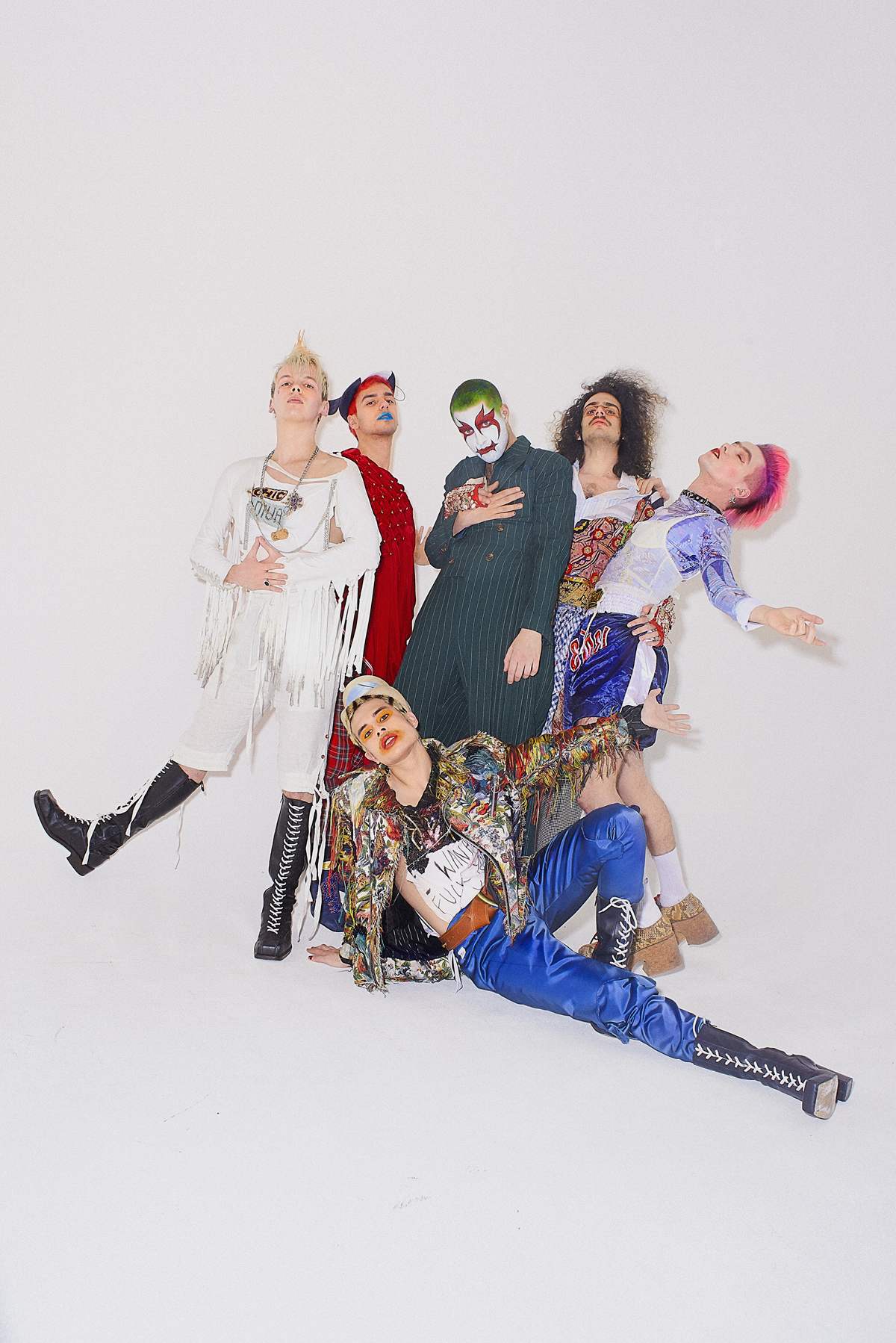Whatever rock is, HMLTD is changing it
It was a school play stint as Shakespeare’s Romeo that gave musician Henry Spychalski the bug. Holed up in Torquay—a tiny seaside town in Devon, Southwest England—then eight-year-old Spychalski took to the stage like a fish to his watery surroundings. The amateur performance marked the future HMLTD frontman’s first taste of the showmanship and vibrancy that would go on to inform his band’s incomparably brash art-rock. But Torquay didn’t have much time for such frivolity—before long he was sent off to an all-boys’ high school, surrounded by the brawn and pig-headed masculinity of a bygone era.
“The environment is toxic,” he says today of his former Devon home, “and it’s a complete anathema to any kind of creative endeavor that you might be fostering.” Hiding his true self from the small-town mentalities around him, Spychalski self-censored at every turn. Fearful to let himself blossom, he grew in silence, twisting like a sunflower towards the light he saw emanating from a distant London. “London was kind of like a beacon,” he admits. “It was a bit of a mythical place, which I’d always pinned all of my hopes on. I invested a lot of hope, and all my dreams, in this idea that I had of London, which I could never really be certain was a fiction or a reality.”
As is usually the case, it was a bit of both. Spychalski’s all-boys’ school years passed largely without incident as he hid his true self—today proudly displayed through semi-androgynous style and a collage of thespian influences worn proudly on his sleeve—behind a wall of social conformity, with regular trips up to the British capital cementing his desire to move there. He basked in the big city’s artistic underbelly. Dipping into arts schools and creative spaces, the young Spychalski eventually formulated a plan, picking up a Philosophy degree at the University Of London and shipping himself away to the bright lights of the big smoke.
A population over 120 times bigger than Torquay’s quickly overwhelmed Spychalski. He feared he’d made a mistake. “Despite having fetishized and looked at London for a long time, I still had, in a sense, a village mentality,” he admits. From knowing his neighbors’ every move, to not knowing who even lived in the room above, it was a culture clash that he combatted with creativity. Before his move, he’d seen only two or three live shows, and so he swan-dived into London’s music scene. It soon became a homogenous mass of plaid shirts and indistinguishable white noise.
“Initially it was extremely exciting just to see anybody on stage, because it was something I’d seen so few times in my life,” he says. “But, maybe because of that position of newness and naivety, I was able to see very quickly how similar everything was. Everything seemed very uniform. I’d go and see bands and it’d just be four dudes on stage playing guitars and staring at their shoes. I got really bored—I was a lot more interested in trying to change that. There was no showmanship and there was no attention being paid to the audience: it seemed very solipsistic.”
A series of chance meetings initiated that sea-change. One too many bevies in a London pub one night left a panic-riddled Spychalski in the arms of a drunken Duke, a Parisian guitarist with a similar disdain for musical mundanity. They swapped stories through the night to bring Spychalski back from his drug-addled brink, and the following morning saw the sun rise on a new London, with Spychalski and Duke at its fore. Others soon joined their patchwork group—keyboardist Zac, a circuit-bending enthusiast who Duke had met through sound manipulation threads on Reddit and the less vile corners of 4chan, and James, a fellow guitarist who’d taken up board and lodging with Spychalski after his own terrified move to the city.
They squeezed their six-headed new guise into a practice room and began hashing out a sound as far removed from London’s sludge-rock du jour as possible. Inspired by their own anxieties and disparate backgrounds, the “anything goes” music and mentality of HMLTD became the refuge for their true selves—ones which they were still fearful to put forward. Spychalski himself spent four months sat in the corner of the practice room, reluctant to pick up a mic in front of his new friends, let alone an audience. “We didn’t play the venues where other bands played, because we were almost too scared to get in contact with the promoters,” Spychalski admits. “What we ended up doing was playing real toilet venues—comedy clubs, or pay-to-play promoters, the real lowest of the low.” Inspiring awe and anger in equal measure, Spychalski soon found his flow.
Nowadays, HMLTD are at the forefront of London’s modern creative renaissance. Spearheading a bunch of fearless, mind-melting new bands like Sorry, Goat Girl and Shame, and inspiring their fans to shake off their own small-town shackles, their upcoming debut album looks set to inspire a new generation in the same way London once inspired Spychalski. They’re a beacon all of their own, skulking stages with that same pomp and power Romeo wooed his muse with—violent delights in a world of safe conformity.







